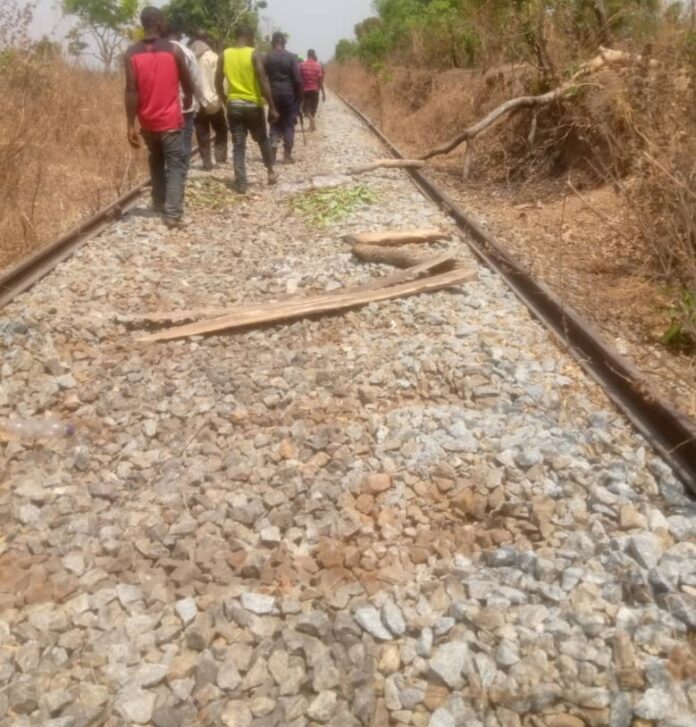A stretch of rail line where the sleepers have been stolen around Gudi, Nasarawa State, within the Makurdi – Kafanchan sub-district, North-Central Nigeria.
Abasifreke Effiong
Vandals have destroyed and cart- away an estimated 30 kilometres of main rail, sleepers and fastenings on the Markurdi – Kafanchan railway in Nigeria’s North-Central region since active train operations stopped on that route.
The Nigerian Railway Corporation (NRC) halted train operations on the Markurdi – Kafanchan line under the North-Central sub-district covering Nasarawa, Benue, substantial parts of Plateau and Kaduna States, in 2017, due to insufficient locomotives.
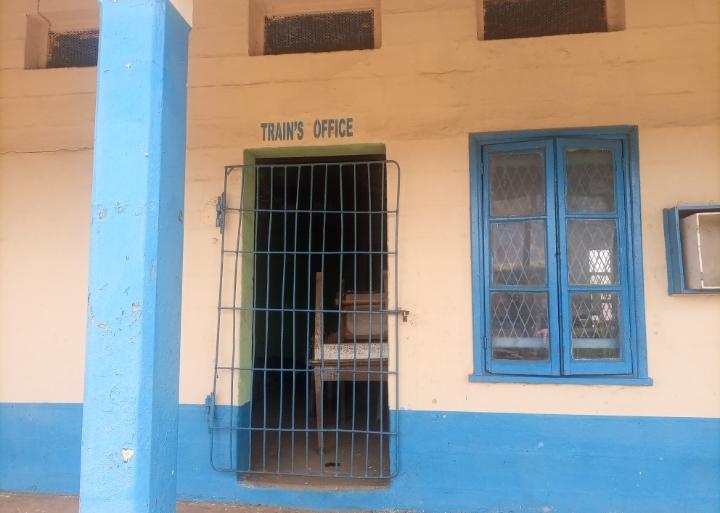 Train office for Makurdi -Kafanchan railway sub-district under lock and key. (Credit: Abasifreke Effiong).
Train office for Makurdi -Kafanchan railway sub-district under lock and key. (Credit: Abasifreke Effiong).
Since then, staff of the Corporation paid by the federal government to protect the railway have abandoned the tracks, giving unhindered access to metal scrap scavengers to move in, vandalise and steal kilometres of rail track, sleepers and clips.
Police have arrested staff of the Corporation for aiding criminal vandalisation of the rail track passing through many communities and towns in the North-Central region, which has remained a flashpoint of insurgency since 2013.
Boko Haram insurgents, cattle rustlers and armed herders have killed thousands of farmers, women and children in Southern Kaduna, Benue, Plateau and Nasarawa States causing residents to fled their homes. An estimated 200,000 persons who have fled their homes are scattered across over 20 internally displaced persons (IDPs) camps in Plateau, Nasarawa and Kaduna States.
Investigation by The Dune newspaper between June 2021 and June 2023 has revealed that over 30 kilometres of rail track have been cut and carted away by vandals on the Makurdi -Kafanchan line. More than 40,000 sleepers, and clips have been vandalised and stolen by local vandals and metal scrap scavengers working for syndicates that supply metals to steel companies for steel production.
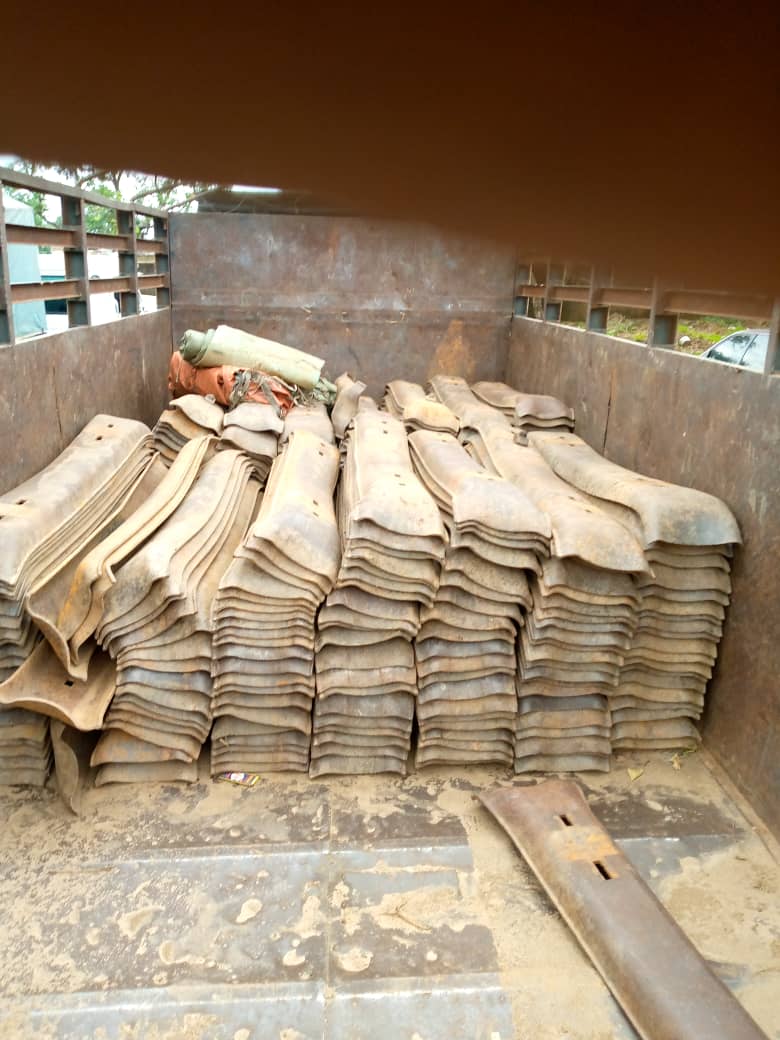 Railway sleepers recovered from vandals.(Credit:Abasifreke Effiong)
Railway sleepers recovered from vandals.(Credit:Abasifreke Effiong)
It is difficult to know the exact stretch of rail track vandalised so far because part of the rail line passes through communities long abandoned due to insecurity. Some other parts of the line run through thick bush that cannot be accessed for safety concerns.
In May 2021, a month before The Dune started this investigation to unravel causes of the large-scale vandalisation of the rail line, the Anti-Vandalism squad of the Nigerian Security and Civil Defence Corps (NSCDC) in Kafachan, Kaduna State impounded a truck carrying 1600 vandalised railway sleepers and clips.
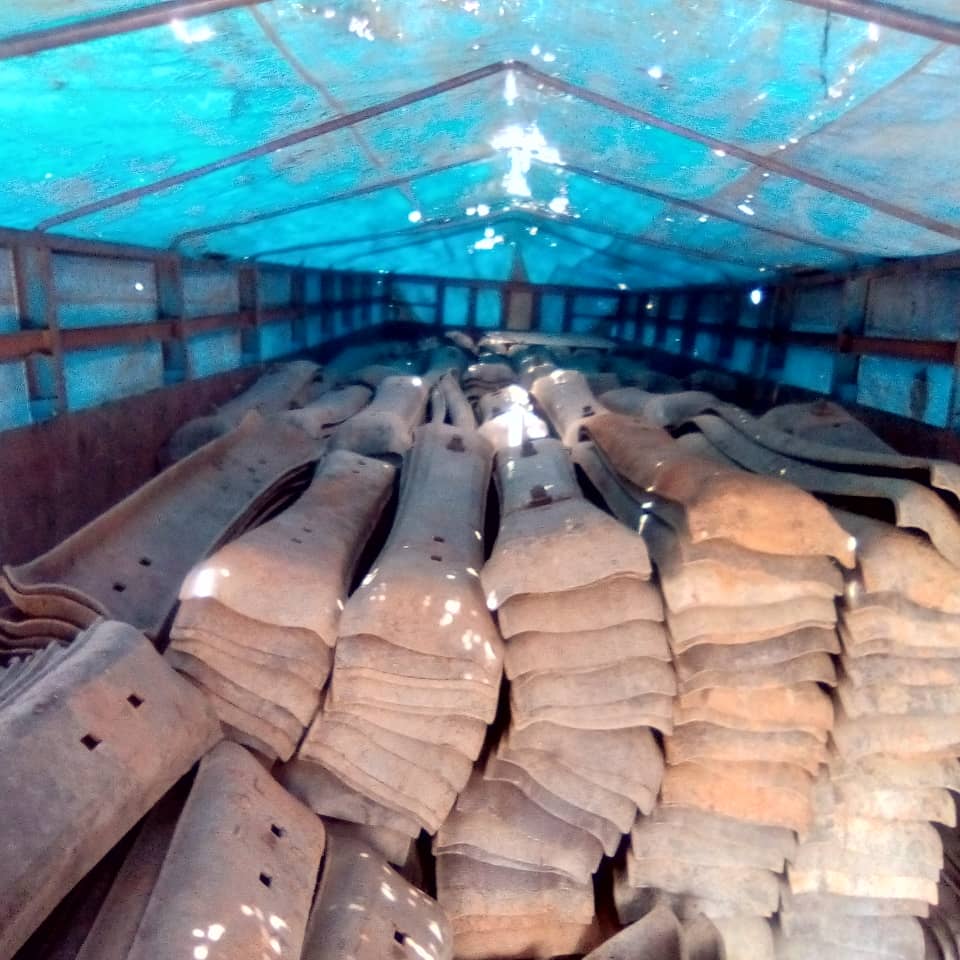 Truck-load of vandalised railway sleepers impounded by the Nigerian Security and Civil Defence Corps, C Division, Kaduna State.
Truck-load of vandalised railway sleepers impounded by the Nigerian Security and Civil Defence Corps, C Division, Kaduna State.
Kaduna State Commandant of NSCDC, Abdullahi Nuraddeen, pegged the value of the stolen components of the rail line at N39.1 million.
In 2022, the NSCDC alone recovered a total of 1,100 stolen rail sleepers, Public Relations Officer, Kaduna State Command, DSC Habeeb Badamasi, disclosed this in January 2023. The number did not include lengths of rail track recovered.
In Agyaragu, a town near Lafia, the Nasarawa State capital, rail track passing near residential houses have been cut-off by vandals using electric-powered cutting machines. Kilometres of the rail track have been vandalised and carted away in Gudi, a railway town in Nasarawa.
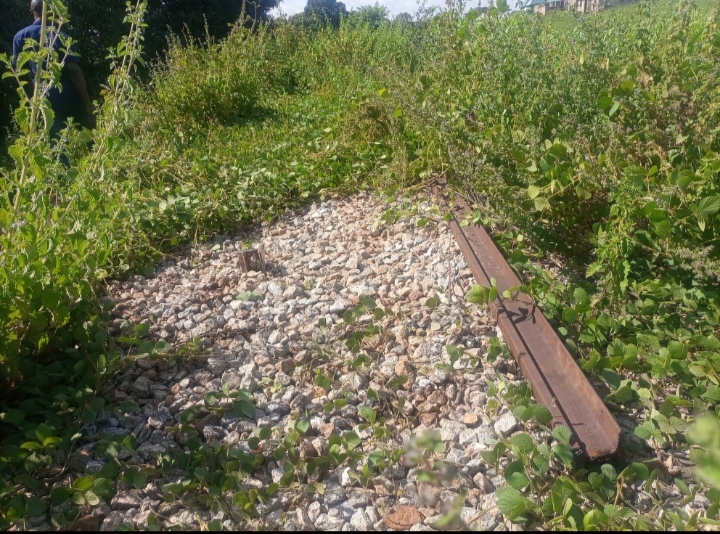 Rail line cut near residential area in Agyaragu.
Rail line cut near residential area in Agyaragu.
In most cases, the vandalisation within residential neighbourhoods are carried out in broad-day light. Yet, people living in the area do not confront these vandals nor alert security operatives.
“If you go out there, they will yell and order you to get back to your house else they will injure you”, a resident of Agyaragu living near one of the spots the rail line was vandalised told this reporter in January 2022 when he visited the spot.
The Nigerian rail track is porous and unsecured. More than 5000 kilometres of the the total rail line in the country pass through forest, bush and non-residential areas, with no fence around the tracks. There are no roads running by the tracks for patrol of security vehicles. The rail lines are open and accessible to anyone including vandals.
Nasarawa State Police Command under CP Bola Longe, now retired Assistant Inspector General of Police, launched an anti-vandalism operation in May 2021, following a national outcry on large-scale vandalisation of Gudi section of the rail track.
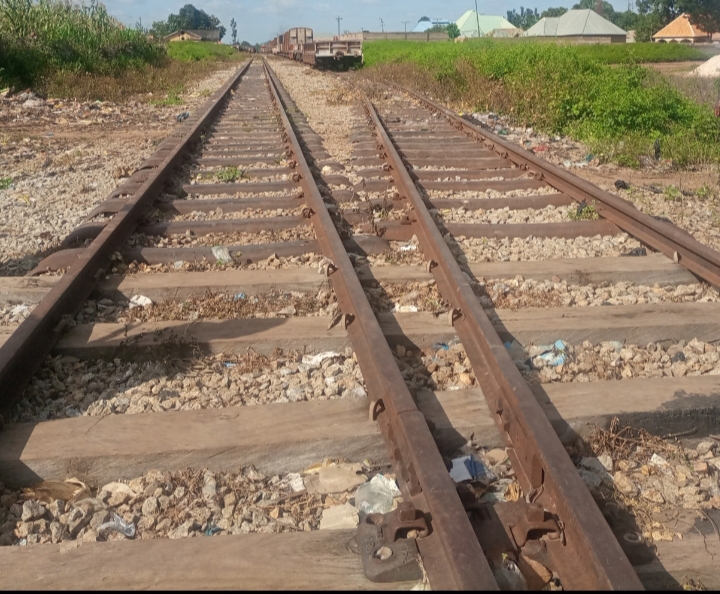 Unfenced Nigeria Railway near Makurdi, Benue State. (Credit: Abasifreke Effiong)
Unfenced Nigeria Railway near Makurdi, Benue State. (Credit: Abasifreke Effiong)
The operation, coordinated by the Command’s Anti-kidnapping unit and monitored by The Dune, yielded significant success between May 2021 and November 2022 with the arrest of over 46 suspects including two Chinese nationals working for a steel company in Edo State; Special Assistant on infrastructure to Nasarawa State Governor, Engr. Abdullahi Sule; security officers and Nigerian railway staff.
The suspects were said to be part of a syndicate of vandals feasting on the abandoned Makurdi – Kafanchan rail line.
The police operations led by the then OC Anti-Kidnapping in Nasarawa State Command, CSP Anietie Eyoh, now an Assistant Commissioner of Police, swept across the State into Abuja. The team impounded five trucks of different sizes loaded with un-boarded or stolen rail track, sleepers, and clips; recovered electric steel-cutting machine, gas cylinder and a welding machine from the suspects.
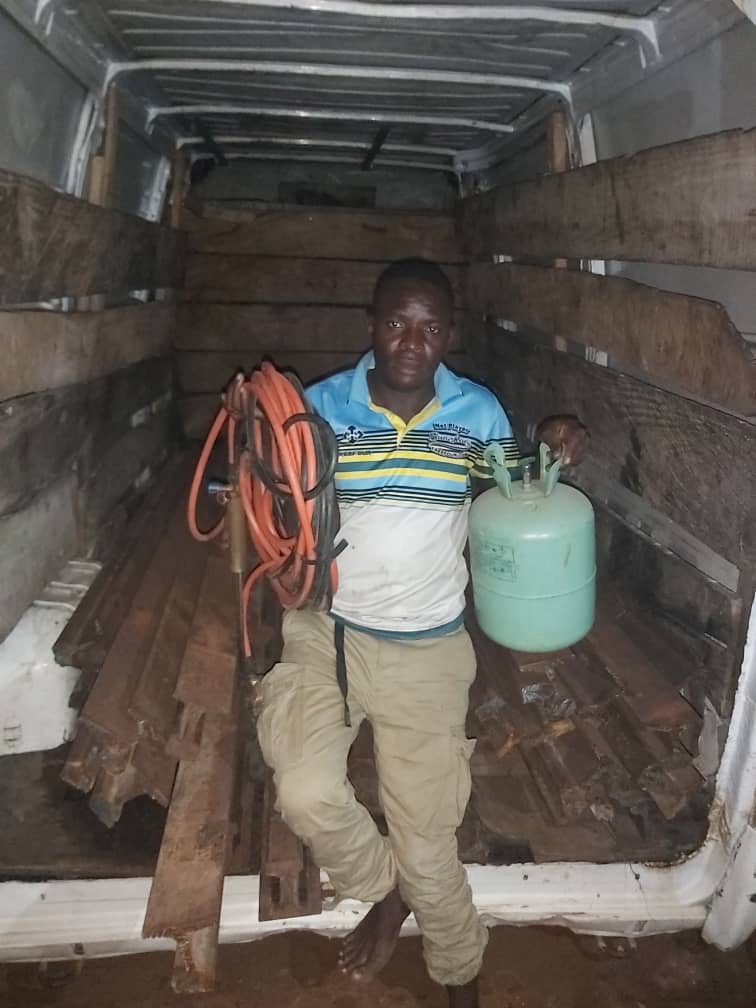 One of the suspected railway vandals arrested by the police in Nasarawa State.
One of the suspected railway vandals arrested by the police in Nasarawa State.
All suspects arrested in that operation were charged to Court later in 2021, Soyemi Adesina, Nasarawa State Commissioner of Police who succeeded Mr Longe, said in an exclusive interview granted The Dune in October 2021.
Six of the suspects have so far been convicted by the Federal High Court, Lafia. Prosecution counsel, Barr. O. Tijani, said the police are working with the Nasarawa State Government to ensure other suspects still standing trial are convicted.
Three of the convicts, Haruna Musa, 45 years old, from Fuska Mata, Bassa Local Government of Plateau State, Umar Mohammed, 17, from Angwan Tiv, Nasarawa State, and Abdullahi Ibrahim, 20, of Shabu by Emir Palace, Nasarawa State, were sentenced to two years imprisonment.
Yinka Oyekomi, Femi Joseph, who were arrested for driving trucks conveying vandalised rail sleepers, and Abdullahi Umar, arrested in possession of vandalised railway metal were sentenced to the period they had spent in prison. Oyekomi and Joseph were arrested in November 2021. Umar was arrested in January 2022. They were sentenced fourth quarter of 2022.
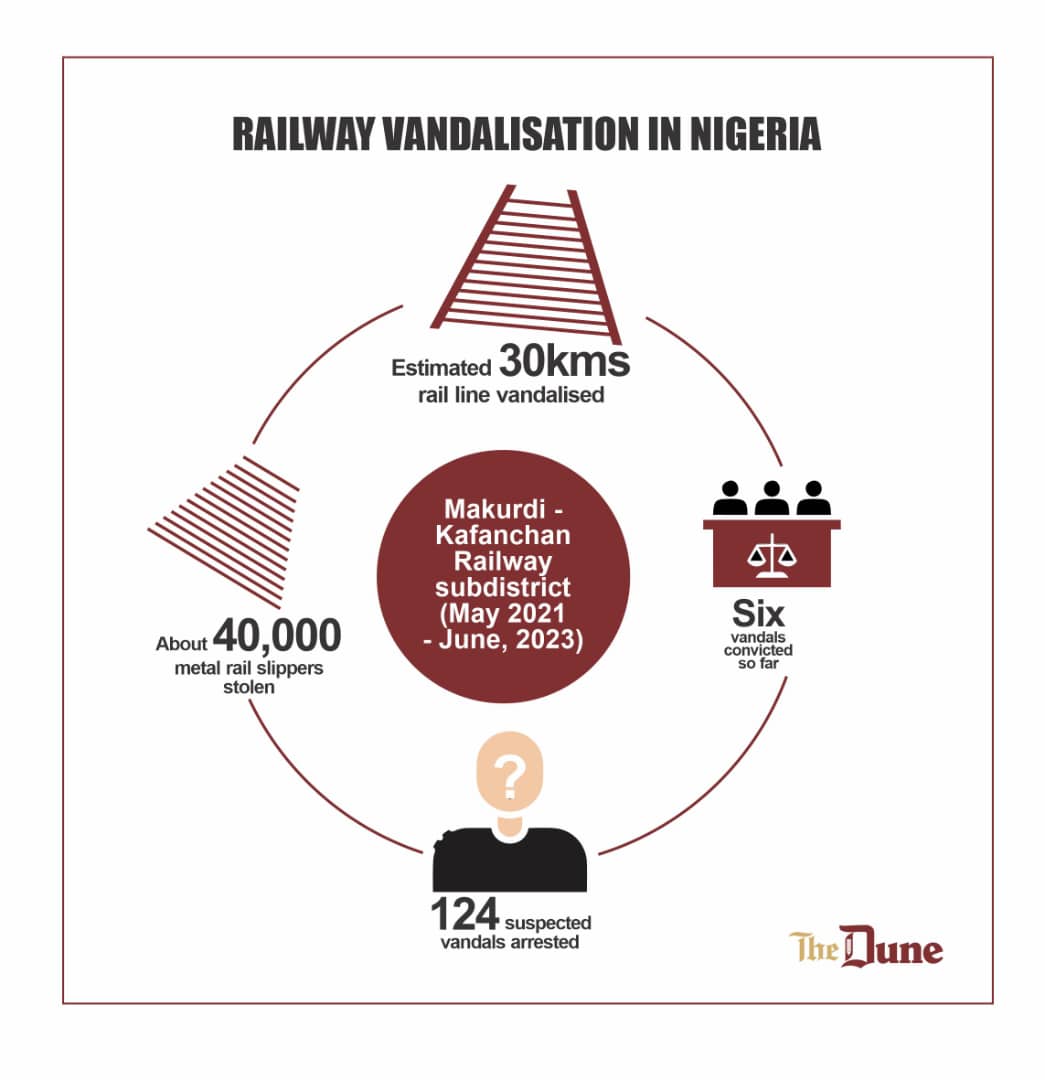 Infographic showing summary of vandalised railway equipment and suspects arrested.
Infographic showing summary of vandalised railway equipment and suspects arrested.
Trial judge, Justice Nehizena Afolabi, in her judgment ordered that the railway sleepers found with the convicted persons be returned to the Nigerian Railway Corporation, and the handover must be witnessed by the Registrar of the Court.
“The vandalised railway sleepers are hereby ordered to be returned to the Nigerian Railway Corporation to an officer of not less than the rank of a director by the Commissioner of Police or an officer to be so appointed by him. Which handover must be observed by the Registrar of this Division of the Federal High Court.
“Evidence of this handover which maybe by photographic means shall be filed in the registry of this Court accompanied by an affidavit of compliance by the Registrar of this court not later than four days after the said handover”, the judgment obtained by The Dune read.
Some observers frowned that despite stark evidence presented by the police, the sentence given to the six convicted persons was too lenient to deter others from the crime. The convicted persons were arraigned on a -one count charge of aiding vandalisation.
Giving a perspective to why the Judge gave such liberal sentence, Prof Abdulkarim Kana, Attorney General and Commissioner for Justice in Nasarawa State (now former) who represented the State Government in the case said Justice Afolabi took into account that the suspects were first-time offenders.
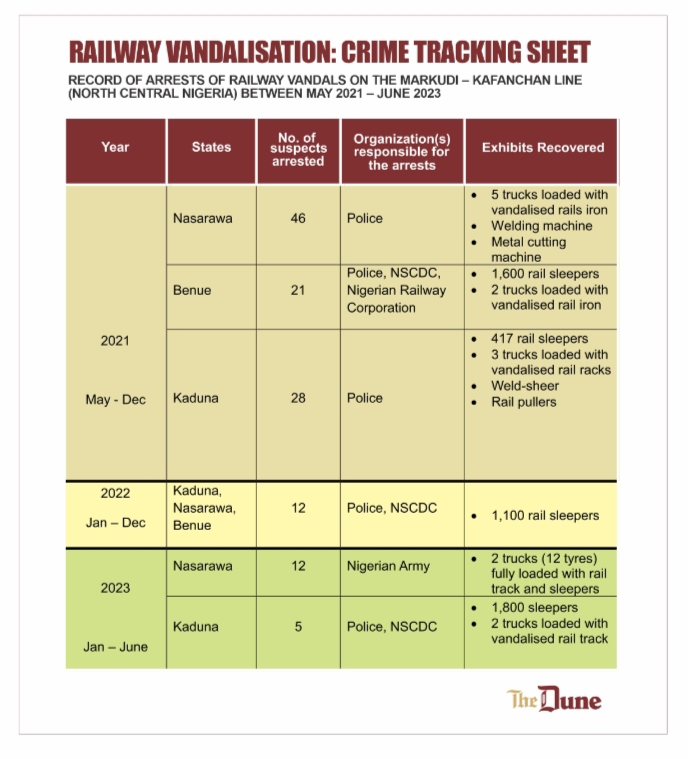 >Infographic showing data on railway vandalisation on the Makurdi – Kafanchan route.
>Infographic showing data on railway vandalisation on the Makurdi – Kafanchan route.
“I must be frank with you. There are different types of judgment and the Judge of the Federal High Court is the type that is quite humane. Being a mother, whenever the issue of sentencing comes up, she always looks at whether a person is a first-time offender or not. We don’t have proofs to show that some of these perpetrators are repeat or habitual offenders.
“So, she relied on the fact that they committed the offence for the first time and handed down very lenient punishment, usually for the term they have already spent in prison before the sentence, hoping that they will not commit the crime again.
“I’m concerned, but for every form of punishment there is a reason. While stringent punishments are usually given to deter people from committing a particular kind of offence, lenient punishments are also done so that humanity can be exhibited. But I agree with you that most of the punishments are very lenient”, Kana said.
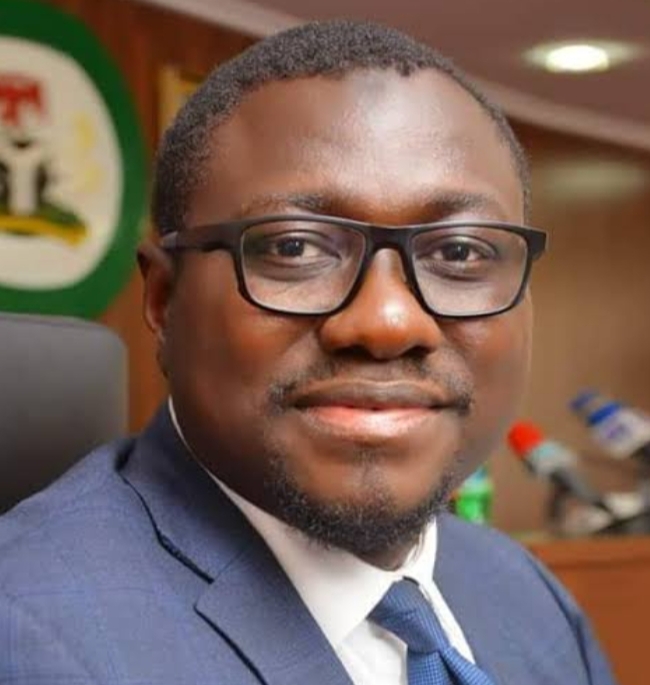 Prof Abdulkarim Kana.(Credit: Google image)
Prof Abdulkarim Kana.(Credit: Google image)
So far, it does not appear that the crackdown on railway vandals by security agencies and the determination of government to ensure those caught face the law, have deterred some persons from vandalizing the rail tracks.
However, our crime tracking data show there was a huge reduction in vandalism on the line between November 2021 and March 2023. Increased police clampdown including arrests, detention, arraignment; serious collaborative determination by the Police and Nasarawa State Government to prosecute over 46 suspects arrested between May 2021 and January 2022 contributed to the reduction.
The police team, from the CP, Soyemi Adesina, to the prosecution counsel showed some determination in prosecution of the suspects.
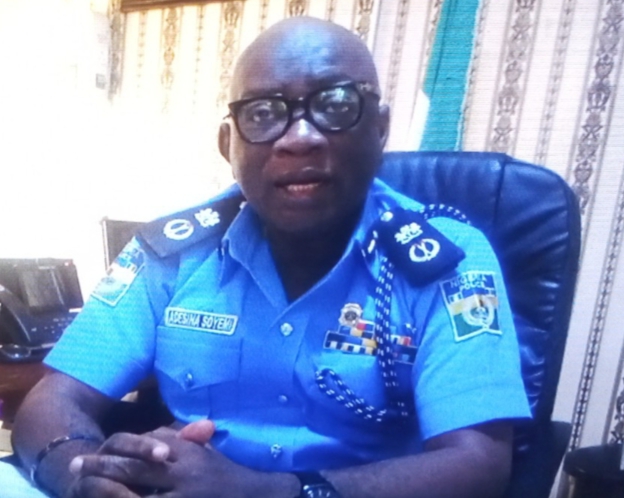 Soyemi Adesina.
Soyemi Adesina.
Adesina said emphatically that the “Police have put in place process to ensure their convictions. Police will ensure those caught for vandalising the rail face the law”.
On his part, Police prosecution lawyer, Barr. Tijani said, “We will prosecute the case without laxity”.
The Nasarawa Attorney General and Commissioner for Justice who represented the State government was present in Court during most of the sittings on the case. The State Attorney also supervised the handing-over of vandalised rail tracks to the NRC as ordered by the Court after the conviction of the first set of six suspects.
The impact of the anti-vandalism operation of the police in Nasarawa spread across the entire region and contributed significantly to the reduction in railway vandalism in 2022. A sister security agency with zonal command in Southern Kaduna acknowledged that the police operations in Nasarawa State led to serious reduction in the spate of vandalisation of the line in the Kafanchan axis.
The zonal head of the agency who did not want his name on print said, “We are very happy about what the police is (sic) doing in Nasarawa. They told me the leader of the police operation is very strict. I learnt some suspects, who have heard how he handled kidnappers, cried when they discovered that it was his team that arrested them. Because they (vandals) know that the police is (sic) serious and will come after them, they have gone home to rest. We have not heard of any new case lately.”
A total of 198 suspects were arrested for railway vandalism across Nigeria in 2022, Commissioner of Police, Railway Command, Yetunde Longe said. Out of that number, only 12 were arrested within the Markudi-Lafia-Kafanchan rail corridor.
Recently, our crime tracker shows the vandals have returned in full swing. Between May and June this year, 16 suspects have been arrested in Nasarawa and Kaduna States.
Kaduna State Police Command impounded three trucks in Sanzwan, Zonkwa, Zango Kataf local government area, fully loaded with railway sleepers between June 22 – 25.
The Command’s spokesman Mohammed Jalige, said one of the trucks with registration number DAL 172 YL carried 600 pieces of railway sleepers.
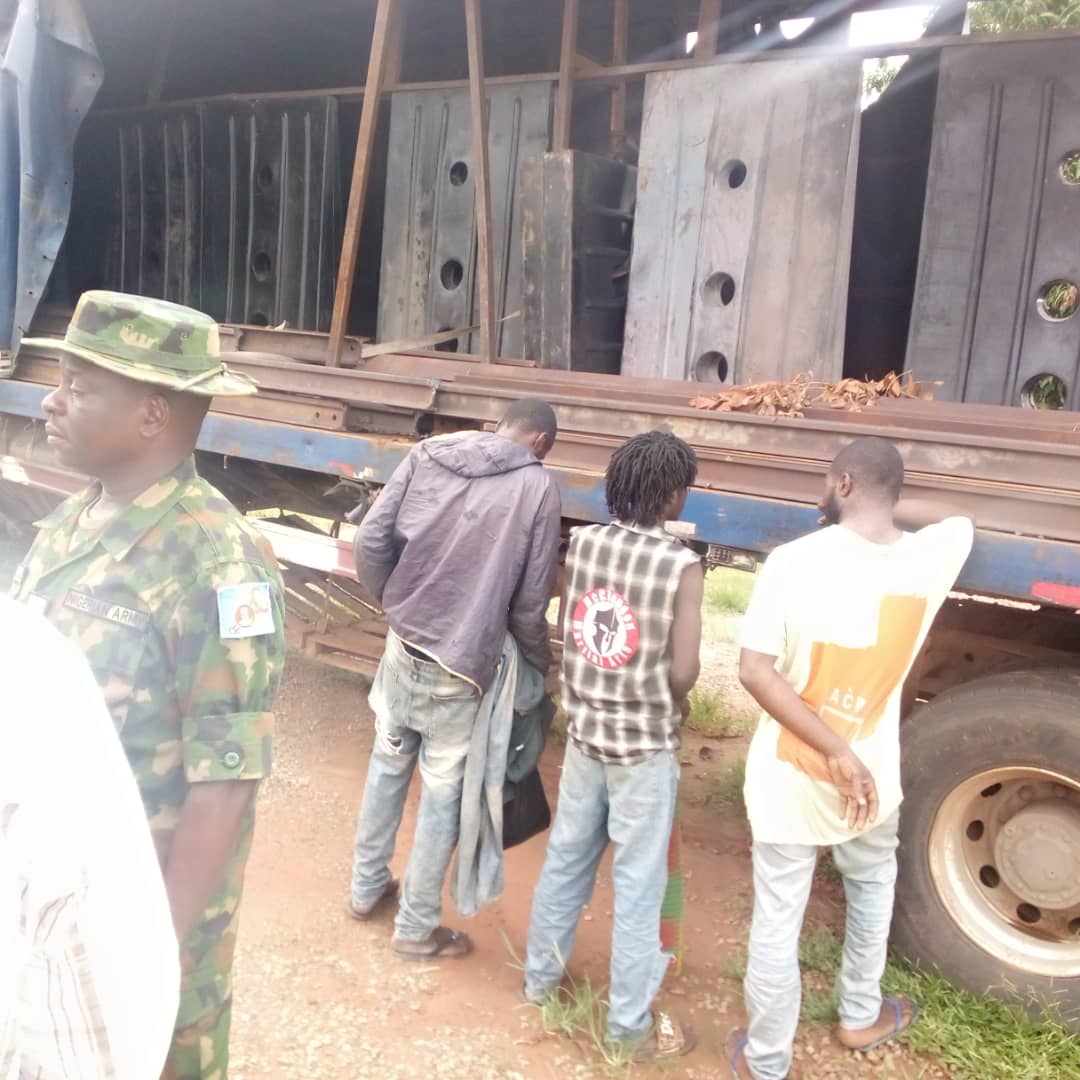 Vandalised railway equipment and railway vandals arrested by Nigerian Army Troop from 4 Special Forces Command, Doma, Nasarawa State.
Vandalised railway equipment and railway vandals arrested by Nigerian Army Troop from 4 Special Forces Command, Doma, Nasarawa State.
Also within the month, military troops from the 4 Special Forces Command in Doma, Nasarawa State arrested 12 suspects with two trucks fully loaded with stolen rail metal at Angwan Yara, Keana local government area, Nasarawa State. More arrests, recovery and impoundment of trucks with vandalised rail track and sleepers have been made by the troops.
▪ RAILWAY VANDALS OFFER HUGE BRIBE TO SECURITY OFFICERS
Two Nigerian security agencies, the Police and the Army, have admitted that railway vandals arrested offered generous bribes to their men on duty in order to be set free .
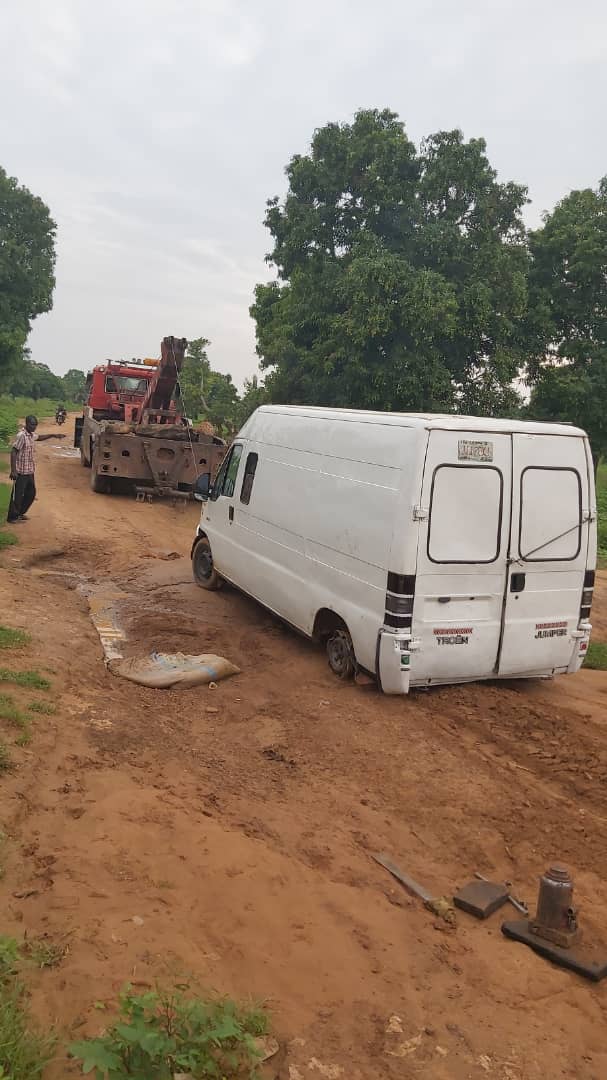 Police in Nasarawa State tow van loaded with vandalised rail from a community.
Police in Nasarawa State tow van loaded with vandalised rail from a community.
In 2021, the Nasarawa State police command said a lawyer working for a foreign company, Yongxing Steel Company Limited, with branches in Abuja and Benin, Edo State offered a cash of N600,000 in bribe to policemen in its Anti-kidnapping unit to free two managers of the company arrested for purchasing vandalised rail sleepers.
Still in Nasarawa State, a truck driver arrested for conveying stolen railway equipment reportedly offered N120,000 in bribe to the men of the command. The offers were rejected.
In June 2023, the Acting Deputy Director, Army Public Relations of the 4 Special Forces Command in Doma, Nasarawa State, Maj. Joseph Afolasade, said rail track vandals offered N5 million in bribe to Army personnel to allow them go with stolen railway equipment found on them.
“On June 15, 2023, troops of the Command during a routine patrol, intercepted five suspected rail track vandals at an abandoned railway station, between Angwan Yara and Agyaragu communities of Keana LGA.
“The suspects were arrested with large quantity of rail track loaded in two (2) 12-tyres trucks. In the course of investigation, the troops arrested additional seven suspects on June 18 who had made confessional statements.
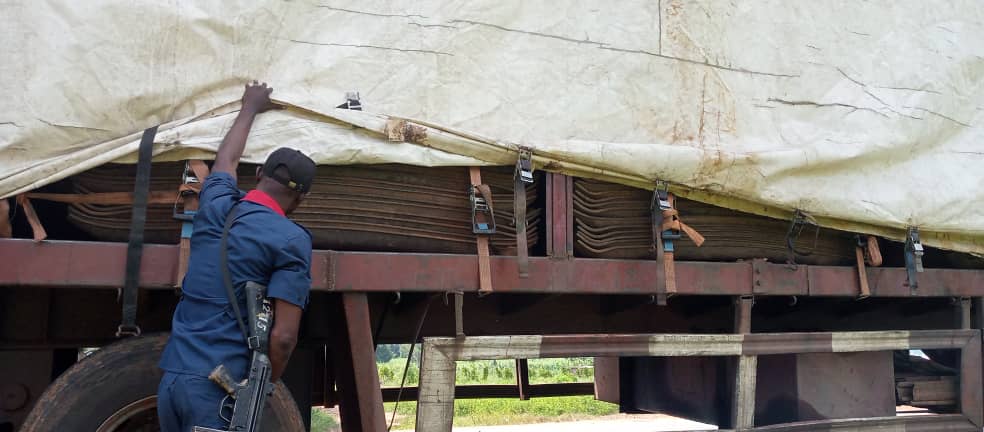 Truck-load of vandalised railway sleepers impounded by men of the Nigerian Security and Civil Defence Corps, Kaduna State.
Truck-load of vandalised railway sleepers impounded by men of the Nigerian Security and Civil Defence Corps, Kaduna State.
“They admitted to have played various roles in the theft of the rail track and mentioned the names of some prominent persons in Nasarawa and Plateau States as being part of the syndicate.
“They offered to give our personnel N5 million to allow them go with the rail track, but our men rejected the money and arrested them”, Maj Afolasade hinted.
• CHINESE FIRM – YONGXING STEEL COMPANY LIMITED – LINKED WITH BUYING STOLEN RAIL LINE EQUIPMENT
Police Anti-kidnapping unit, Nasarawa State command arrested two illegal immigrants working for a Chinese owned company in Nigeria, Yongxing Steel Company Limited. One of them was arrested at a yard in Tungan Maje, near FCT Abuja in May 2021 for buying stolen rail sleepers.
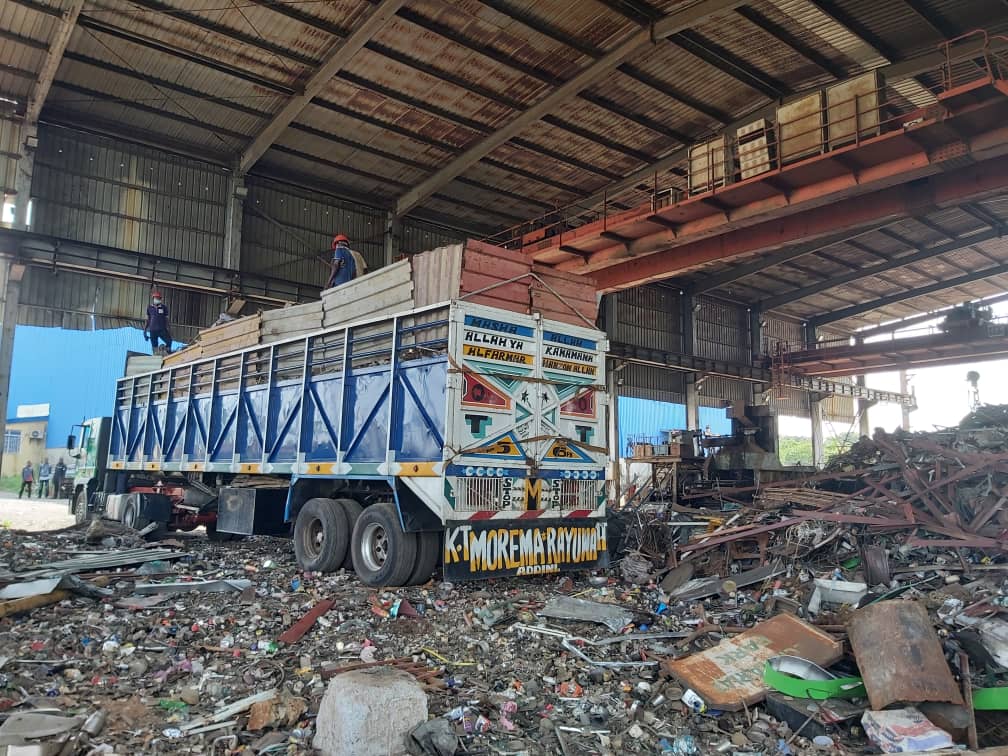 Inside the yard in Abuja reportedly owned by Yongxing Steel Company. (Credit:Nigeria Police Force, Nasarawa State Command).
Inside the yard in Abuja reportedly owned by Yongxing Steel Company. (Credit:Nigeria Police Force, Nasarawa State Command).
The Police claimed the yard is owned by Yongxing Steel Company Limited. The company produces steel for building and constructions.
“A truck driver who delivers stolen railway sleepers from Nasarawa State to Yongxing Steel Company Limited led police operatives to the company”, a policeman investigator told this reporter in 2021.
Yongxing Steel Company Limited with RC Number -1045645, was registered in June 2012 with the Nigerian Corporate Affairs Commission. All four persons with significant control (PSC) in the company – Chen Zhenyu, Lin Qianwei, Yihua Lin, and Xianghai Zhang – are Chinese.
 One of the Chinese nationals arrested by the police in connection to railway vandalisation.
One of the Chinese nationals arrested by the police in connection to railway vandalisation.
Two of the expatriates working for the company paraded by the police in Nasarawa State as members of a syndicate of railway vandals operating in North-Central Nigeria are standing trial at the Federal High Court, Lafia.
They were arrested alongside middlemen in the syndicate including one Yusuf Abubakar Musa, then Special Assistant on Infrastructure to the Governor of Nasarawa State; one Mohammed Isiaka, former Supervisor for Education in Nasarawa Eggon Local Government; a staff of the Nigerian Railway Corporation and an officer of the NSCDC.
Police sources claimed Musa and Isiaka confessed that they bought vandalised rail tracks from locals in Kaduna, Benue and Nasarawa States and sold them to the Chinese company.
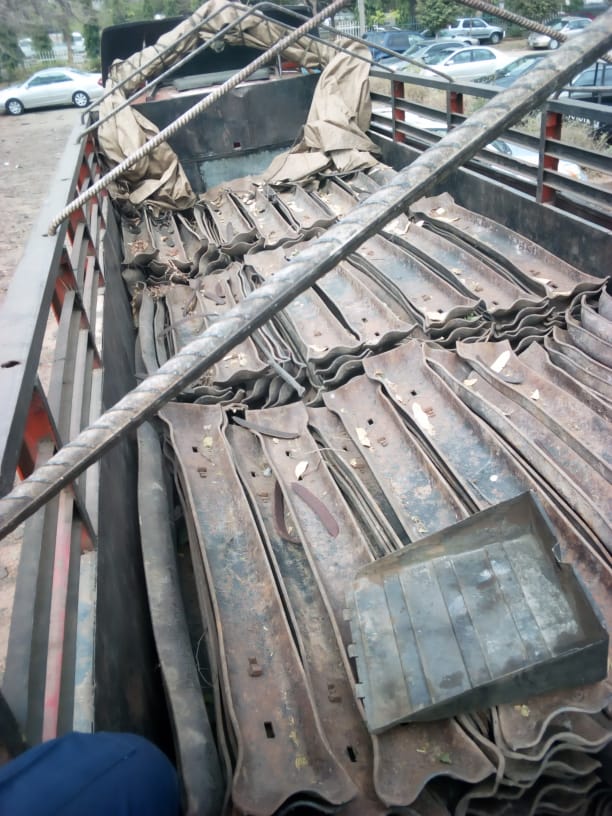 Stolen rail sleepers intercepted by the Police.
Stolen rail sleepers intercepted by the Police.
Musa in an audio-recorded confession he made to the police in Nasarawa, which was obtained by The Dune, said he had previously sold a truck-load of railway sleepers ripped from the Lafia-Gudi section of the Makurdi – Kafanchan rail line for N4.6 million.
Report of police investigation suggests that Yongxing Steel Company Limited was the biggest off-taker of vandalised and stolen rail metal in North-Central.
Prior to their arraignment, a police investigator in Nasarawa State who was involved in the operations said the two arrested Chinese nationals, wrote fake names in their statement to the police.
“They wrote their names as Messr Marra Thai and Messr Deng Wenhui”.
However, when being granted bail upon arraignment before the Federal High Court, Lafia, the Police found the names they wrote on their statements were not same names on their passports and entry visa into Nigeria, which had expired.
“As condition to fulfill their bail, the Court ordered the two Chinese to drop their passports. That was how we discovered they gave the police fake names”, the police investigation stated.
This was confirmed by the lead investigation officer, Anietie Eyoh.
The passports of the suspects which is currently kept by the Federal High Court, Lafia, revealed that their visas had expired as of the time of their arrest.
The passport and visa of the suspect who allegedly claimed his name is ‘Marra Thai’ has his name written as Tai Junlong. Junlong with visa number E3807170, was granted a one-month entry into Nigeria. He entered Nigeria on 9th October 2019.
 Xie Qinglin.
Xie Qinglin.
Co-suspect, Deng Wenhui, named Xie Qinglin on his passport was also given a-one month business visa into Nigeria on 15th October 2020. His visa, numbered E1045552, expired 14th November 2020.
Messrs Junlong and Qinglin visa into Nigeria submitted to the Court as part of bail conditions were no longer within validity, implying the bearers were moving about illegally in Nigeria at the time they were arrested by the Police in May 2021.
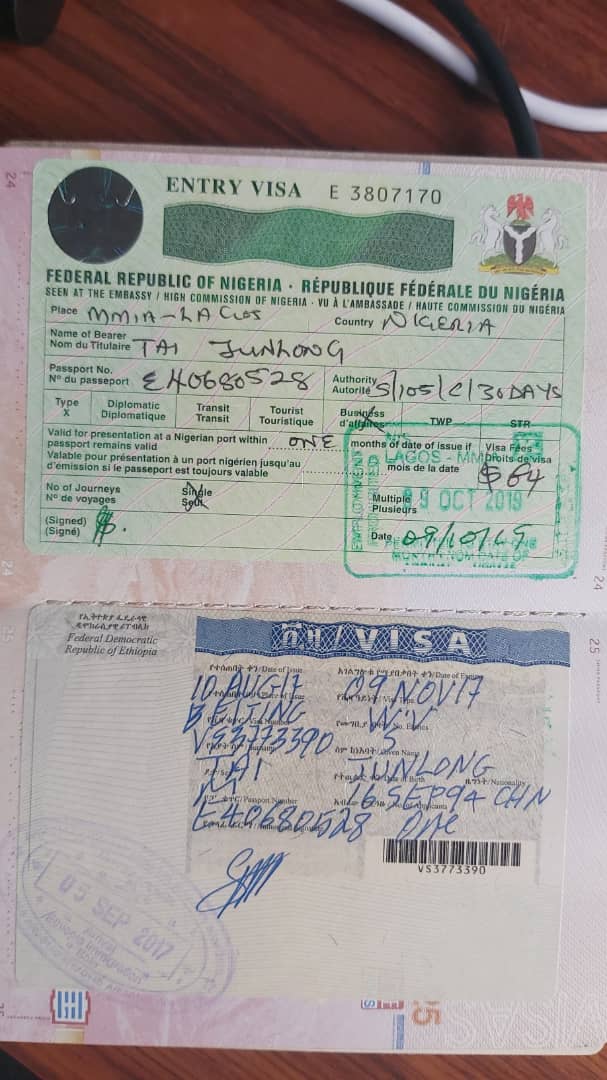 Visa of Tai Junlong.
Visa of Tai Junlong.
This reporter learnt that they did not show any documents to prove they had applied for renewal or regularisation of their continued stay in Nigeria.
The Dune sent a Freedom of Information Request to the Nigerian Immigration Service (NIS) requesting it to verify if Tai Junlong and Xie Qinglin, had applied for the regularisation of their visa after the ones op-cited expired. We also requested for the date of regularisation of the visas and their current immigration status.
Even though we sent a reminder 16 days later after our first request and also drew attention of the NIS Servicom desk to the failure by the organisation to honour our FOI request, the Service’s information desk neither responded nor replied our enquiries.
Without proof of regularisation of their visa, the expatriates are liable to an offence under the Nigeria Immigration Act 2015.
 Visa of Xie Qinglin.
Visa of Xie Qinglin.
Section 57 (5) (c) of the Act states inter alia: “Any expatriate who fails, neglects or refuses to apply for the regularisation of his stay up in Nigeria within the stipulated period of three months; renewal of his business permit, transit visa, visitors pass or Temporary Work Permit (TWP) after expiration; or renewal of his residence permit thirty days after its expiration; commits an offence and is liable on conviction to a term of three years imprisonment or a fine of five hundred thousand Naira or both.”
From offering bribe of N600,000 to the police, allegedly writing fake names on police statements and moving about with expired visa, the attitude of the two staff of the two staff of the Chinese steel company can leave the public to assume that they were working for a company that has questionable business integrity.
▪ REASONS FOR LARGE-SCALE VANDALISATION OF RAILWAY
Beyond the porous and unsecured nature of the Nigerian rail line, this investigation uncovered why local vandals and metal scrap scavengers are neck-deep into destroying and stealing this critical national asset.
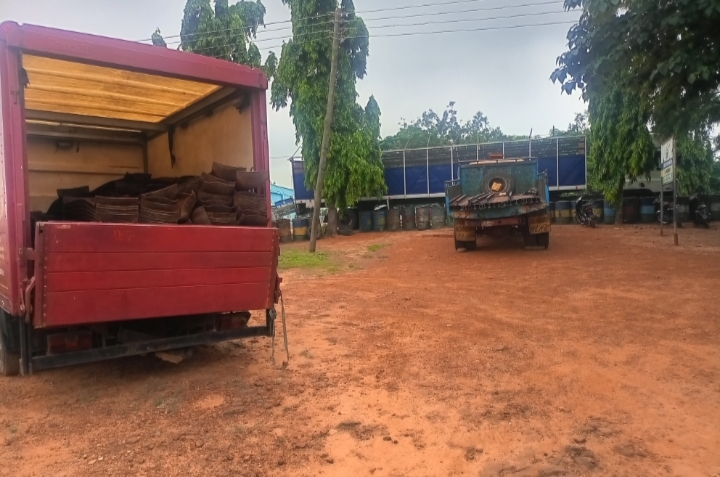 Impounded trucks loaded with vandalised railway materials parked in front of Police Anti-Kidnapping unit, Lafia. (Credit: Abasifreke Effiong)
Impounded trucks loaded with vandalised railway materials parked in front of Police Anti-Kidnapping unit, Lafia. (Credit: Abasifreke Effiong)
Railway metals are in very high demand by steel production companies. There is an assumption that the federal government of Nigeria will phase out the narrow gauge rail soon, hence there won’t be a need for the metals.
Rail tracks and rail sleepers are purchased at premium prices because of its high scrap value, The Dune learnt. The Nigerian narrow gauge rail line and sleepers are made from cast iron or steel.
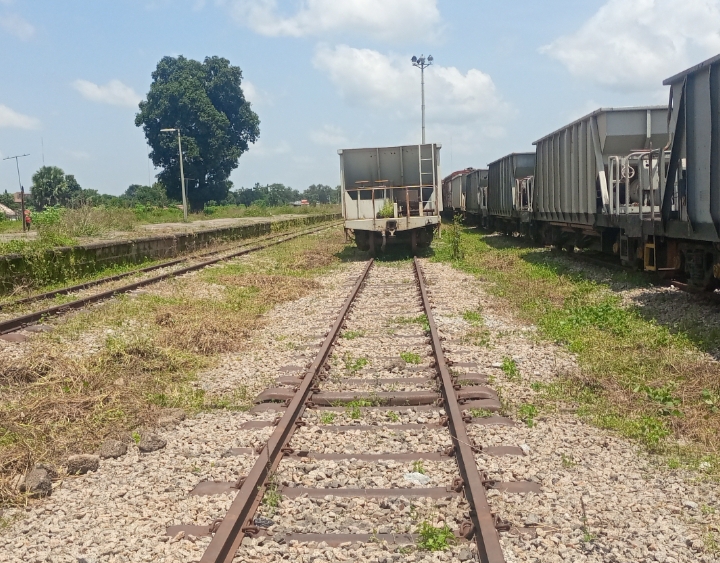 Abandoned wagons at railway terminal in Kafanchan, Kaduna State. (Credit : Abasifreke Effiong).
Abandoned wagons at railway terminal in Kafanchan, Kaduna State. (Credit : Abasifreke Effiong).
According to dailycivil.com, a learning platform for civil engineers, cast iron is resistant to wear and deformation, and does not oxidize or rust by moisture. It has a life span of 35 -50 years and has high scrap value.
Vandals would offer large sums of cash in bribe to security men and pay huge sums to truck drivers to convey stolen rail sleepers to the point of sales because of its worth.
One of the truck drivers arrested by the Nigerian Army troop from 4 Special Forces Command in Doma, Nasarawa State confessed that he was paid N1.6 million to convey rail sleepers from Nasarawa to illorin, Kwara State. A distance by car appropriately 634 km or 8 hours drive, according to ng2Markers.com, a distance map. It will take 63 litres of fuel to cover the distance, according to the site.
Mr Franklin Ajoku, North-Central District Manager, Nigerian Railway Corporation, in a chat with The Dune in 2021 in his official quarter at the railway station in Kafanchan, Kaduna State, spoke on the high demand for railway metals, saying that railway metal is among the purest metals one can find around here. It is easy to recycle and its impurity level is very minimal.
Mr Ajoku said vandals and metal scrap scavengers go as far as stealing old rails used for telephone lines and hanging of clothes at railway buildings because of the high scrap value of the railway metals.
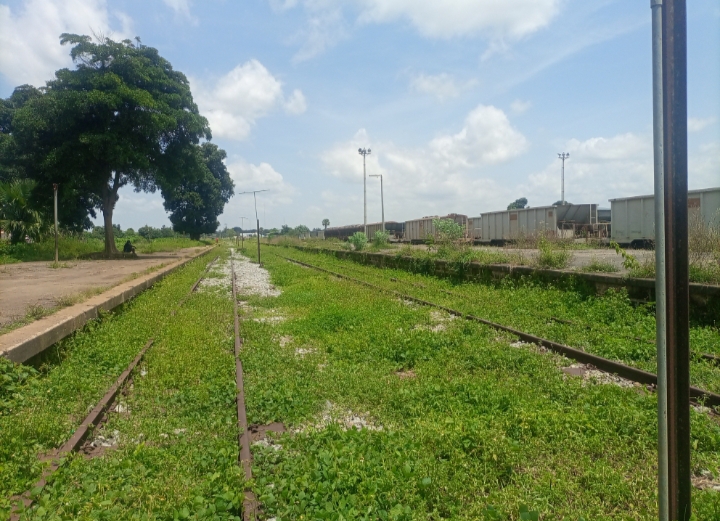 Weeds growing on the railway inside NRC terminal, Kafanchan, Kaduna State. (Credit: Abasifreke Effiong).
Weeds growing on the railway inside NRC terminal, Kafanchan, Kaduna State. (Credit: Abasifreke Effiong).
Ajoku whose grandfather and father had worked with the railway corporation said from his experience this was the first time there is such large-scale vandalisation of the rail.
“I have been a railway boy. My grandfather and father worked in the railway corporation. So, I have lived a greater part of my life in railway quarter. In railway buildings, old rails were used for boundaries, the telephone lines were drawn using rails as bars, now it is not so, they are stolen. Even old rails used for hanging clothes are stolen, you will see your clothes on the ground.
“The derivation is high for those stealing rail track equipment. Steel companies see rail track as raw material. With the Dollar-Naira exchange rate, some companies cannot afford steel, rather than looking outwards to import, they look inwards, and inwards is, where can you get this thing? The railway.
“Steel companies were shutting down, but with the invasion of the railways, they are coming back to live. The daily consumption of steel is unimaginable. So people have found this as a flowing business. It is a means of livelihoods. If you see some of those running these shows you will bow and greet them. They are big shots in this country who are doing it, not as in coming out by themselves to do it”, Ajoku hinted.
Beyond its scrap value, the introduction of the standard gauge railway in the Lagos-Ibadan, Lagos-Kano and Abuja-Kaduna routes has fuelled erroneous public assumption that the narrow gauge line was no more useful.
This was the thought of Ajoku, and Adesina, former Commissioner of Police.
“There is this believe that because trains have not been moving and the promise by the federal government to standardize the gauge, people tend to believe that probably federal government had forgotten about the narrow gauge that were in use before and that makes some people think they can go in there and vandalise them”, Adesina analysed.
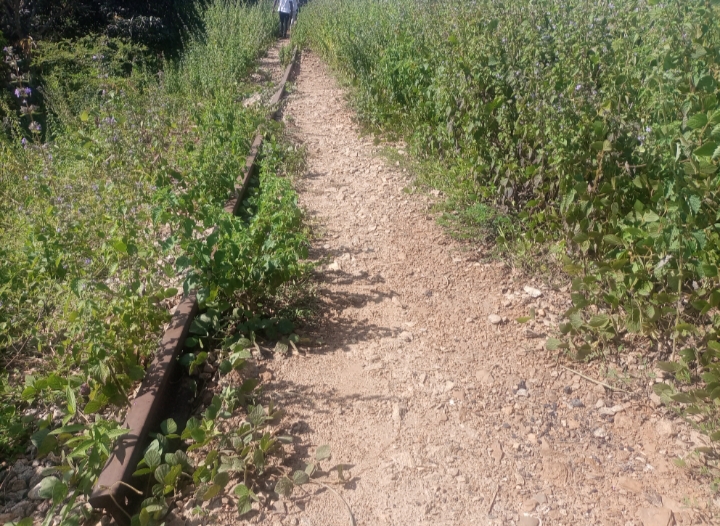 Rail track vandalised inside a bus near Gudi, Nasarawa State. (Credit : Abasifreke Effiong).
Rail track vandalised inside a bus near Gudi, Nasarawa State. (Credit : Abasifreke Effiong).
Adesina, who was Commissioner of Police in Nasarawa State at the time he granted this interview, was instrumental to the diligent prosecution of the first set of suspects sentenced for railway vandalisation in the State.
Majority of steel products in Nigeria are produced from scrap metals.
According to the Federal Ministry of Mines and Steel, over 95% of the current steel production in Nigeria is from scrap metals. There are a total of 43 steel plants and fabricating outfits in the value chain, 90% operates in the downstream sector, relying on metal scraps for production of billet.
Iron and Steel industry in Nigeria developed as a public funded industry. Effort at developing iron and steel started in 1979. Working in partnership with foreign companies, the federal government built two integrated iron and steel plants at Ajaokuta and Aladja, and three steel rolling mills in Katsina, Jos, and Osogbo. These projects undertaken between 1979 and 1983 were to kick-start a vibrant iron and steel sector. Today, they are moribund.
Elijah Ohimain, of the Niger Delta University in his research work on the challenges of domestic iron and steel production in Nigeria noted that all the public owned steel companies folded up due to “political, technical, logistical and managerial challenges.”
Nigeria has a proven large deposit of the four major raw materials – iron ore, coal, natural gas and limestone – needed for steel production, but it has not been able to develop its iron and steel sector. Steel companies in the country rely on importation of steel billets or recycling of metal scraps to produce billets.
▪ SALES ROUTES FOR STOLEN RAIL EQUIPMENT ON THE MARKUDI -KAFANCHAN CORRIDOR
The over 40,000 sleepers, an estimated 30 kilometres of rails, and thousands of clips vandalised and stolen from the Markudi – Kafanchan railway sub-district in Nigeria’s north-central region are sold within and outside the region.
According to the NRC, long stretches of the main rail line and sleepers have been vandalised along Achakpa – Agyaragu section, Lafia – Barkin Abdullahi, Udei – Kadroko, Behind NASME Barrack, Makurdi – Daudi, Madaki station, among others.
Steel companies buy them at premium prices, recycle and produce billets for their production. Almost all the steel companies currently operating in Nigeria depend on recycled steel.
The Dune found out that truck drivers arrested for transporting stolen railway metals within the sub-district were taking the consignment to either of five destinations – Abuja, Benin, Illorin, Osogbo, and Lagos.
In Makurdi, Benue State, security agencies have intercepted canoes used for transporting vandalised railway materials along Benue bank, Wurukum.
▪ NEGLIGENCE OF THE RAILWAY BY STAFF OF NRC
Although trains are no longer moving on the Makurdi – Kafachan rail line, the federal government has not laid off staff engaged on train operations in the region.
Staff whose duty it is to secure and protect the railway are still receiving salaries from homes, while the assets they were employed to protect are being vandalised.
The District Manager said because “trains are not running does not mean we should close shops. Part of our responsibility is manning and monitoring those rail lines”; a responsibility they have neglected.
Under the Civil Engineering Department in the NRC, there is a unit called Gangs.
Whether the trains are running or not, it is the duty of the gangers to ensure the rail lines are in order. They should monitor the lines daily to make certain that there are no wash-outs, weeds growing, or vandalisation of the track. Sadly, they are rarely aware when and how many places their line has been vandalised.
An ideal gang is made of up of eight persons led by the ganger, and assisted by a sub-ganger. Their job is supervised by a track technical officer who is supervised by senior track officers who report to the principal track officers.
In the district, the principal track officers are supervised by two principal civil engineers. There are about 15 gangs, each expected to cover 6kms of the track.
Despite the multiplicity of command in the civil engineering department, vandalisation is going on even in day time, unhindered and unchallenged, and no one is queried nor lost his job.
Ajoku argued that the gangs are short-staffed. “From my latest findings, we have 1+1+2” that is four, “instead of 1+1+6”, eight, which is an ideal gang.
The Managing Director, Nigeria Railway Corporation, Fidet Okhiria, in a report published by the Punch in October 2022, said the Corporation gets to know about an act of vandalism on the rail line, sometimes a month after the incident.
“What we have discovered is that most of the time before you discover, it might have happened about a month ago.”
Okhiria’s statement underscores the negligence and the Corporation’s lack of capacity to man the tracks.
The NRC has not shown interest in prosecuting those arrested for vandalisation of their infrastructure.
Professor Kana had accused the NRC of complicity in the vandalisation of the rail tracks.
Speaking to this reporter after a court session where he represented Nasarawa State during the arraignment of railway vandals, Kana said, “the Nigerian Railway Corporation has not shown any concern and I think what you have to do is to find out from them why. They rarely come to Court or come and say look, these are our property, we want to take it back.
“The Court will give judgment and we will be expected to be the ones to work with the Police to find a way of taking those things back to the Corporation. They never show up, they don’t look for it on their own, so it looks to me that they are unconcerned about what is going on. I don’t want to accuse anyone of complicity.”
Abdulkarim Kana, Professor, Law of Economic and Financial Crimes, former Dean Faculty of Law, Nasarawa State University, Keffi, was still the Attorney General and Commissioner for Justice, Nasarawa State as of Feburary 2023 when he spoke with this reporter.
▪ VANDALISM THREATENS NASARAWA/RUSSIAN RAILWAY PROJECT
The large-scale vandalisation of the national rail line in the North-Central region might completely stall Nasarawa State government’s lofty attempt to build its own railway to link Abuja and Keffi.
Governor Abdullahi Sule’s administration signed a Memorandum of Understanding (MoU) for the construction of the Abuja – Keffi rail and a rolling stock production centre, with a Russian rail transport giant, CJSC Transmasholding in 2019, during the inaugural Russia/Africa summit in Sochi.
Feasibility contract for the project was awarded in 2022 to Gefest Corporation.
Prof. Kana said large-scale vandalisation of the national rail line might “discourage the government because it will now raise the cost of the project. What we were supposed to do before was to link it from FCT to Gudi with the existing line but the existing line has now been vandalized, almost all of it has been stolen. As a State we have reasons to be concerned and that is why we have taken steps to ensure the stolen lines are brought back.”
The Nasarawa – Russia rail project might not come to fruition, even though the administration insists that it was forging ahead with it.
▪ DEAD RAILWAY TOWNS & THE REPORTER’S HARROWING EXPERIENCE
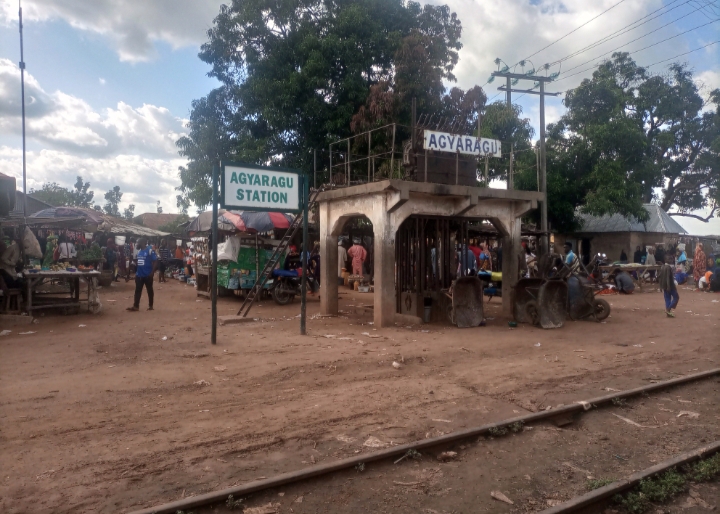 Agyaragu train station, near Lafia, Nasarawa State. (Credit: Abasifreke Effiong)
Agyaragu train station, near Lafia, Nasarawa State. (Credit: Abasifreke Effiong)
Railway stations and terminals at Barikin Abdullahi (BAD), Gudi, Agyaragu and Kafanchan that were small towns and bubbling economic hubs are now dead towns. No economic activities in any of these places anymore.
What remains are relics. Rusty wagons. Giants grasses have overgrown some of the old wagons at the Kafanchan terminal in Southern Kaduna. The buildings, administrative block, ticket and passengers’ lounge, are dilapidated.
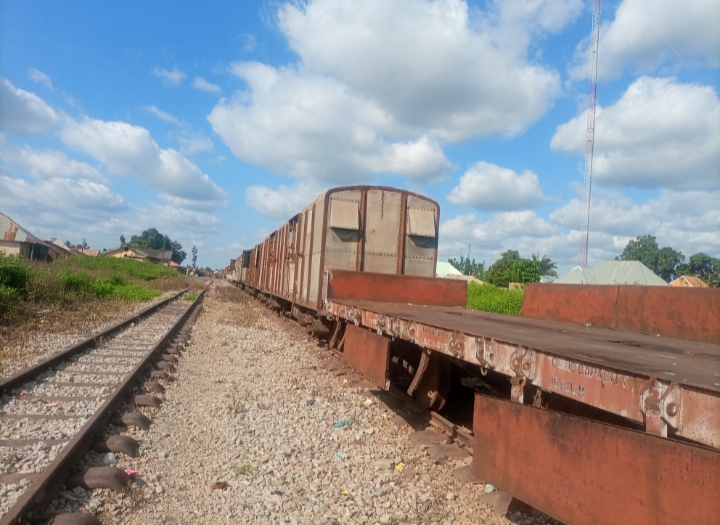 Relics of Nigeria railway infrastructure in Nasarawa State. (Credit: Abasifreke Effiong)
Relics of Nigeria railway infrastructure in Nasarawa State. (Credit: Abasifreke Effiong)
The station in Agyaragu, is now a refuse dump, the old wagons there were filled with household wastes.
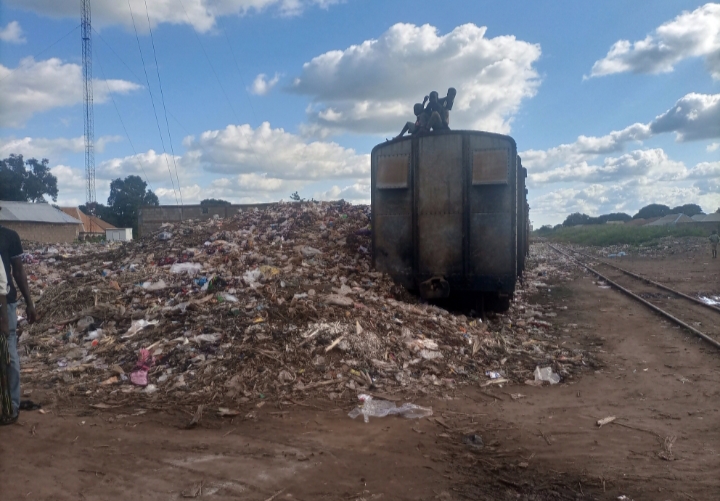 Children playing on abandoned wagon atop a heap of refuse in Agyaragu.
Children playing on abandoned wagon atop a heap of refuse in Agyaragu.
Mohamed Haruna who used to work as a loader at the sub-station said he has been jobless since trains stopped moving on the line.
Haruna who spoke in Hausa frowned at the vandalisation of the rail line and called on the federal government to revisit the abandoned railway.
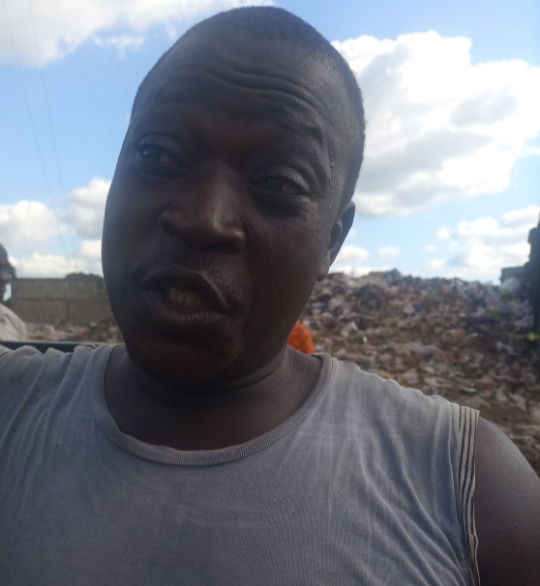 Mr Mohamed Haruna.
Mr Mohamed Haruna.
Excerpt of Haruna’s interaction with The Dune as transcribed and interpreted by
our fixer and Hausa language interpreter, Happiness Anthony, reads:
“I am not happy about the destruction of the railway. When the train station was active, I used to load and offload good on the train, that was my source of income and through that I was feeding and paying my children’s school fees. Since the train stopped passing, I have been jobless and it has not been easy for me.
“Frankly speaking, I cannot tell if those destroying this railway are from this community. But one thing is certain, there are insiders helping them to escape with the items. We are still looking out to see if we can catch anyone who is involved in this devilish act and report him to the police.
“I will love the government to revisit the abandoned railway.”
Haruna was seen sitting at the railway office at Agyaragu station.
The railway station at Agyaragu is a hotbed of open defecation. As this reporter alighted from the car near the sub-station, strong, hot, unsavoury stench of faeces rend the air.
The sun was scorching. Children were playing on the mounds of wastes, some playing inside the old wagons. People were buying and selling tomatoes, garden eggs, sugar cane, watermelon, vegetables and other food stuffs displayed on nylons on the ground at the railway market. They were not bothered by the foul odour.
Different sizes of human faeces littered a stretch of the rail track from the station. Some of the mounds of faeces had dried up by harmattan and the scorching sun of January 2022.
Two teenage boys and an adult male were seen defecating on the rail track. They were unperturbed even as people approached and walked pass them.
This reporter counted about 200 spots where people defecated on the rail line within a-20 minute very-slow-pace walk to take note of happenings at the station.
The reporter, fixer and interpreter had to tiptoe to avoid stepping on fresh shits. There is no guarantee however, that we did not step on a few, the ones dried by harmattan and scorching sun.
Shops around the railway market are used as to living houses. Families are residing in those shops. However, there are no public conveniences around.
According to UNICEF WASHNORM 2021 report, 46% of Nasarawa State population practice open defecation. The State ranked 9th position in open defecation in Nigeria. On top of the chart were, Ebonyi, Plateau, Kogi, Oyo, Kebbi, Enugu, Niger.
Within the period of this investigation Nasarawa State government had announced that it was taking “stringent measures to end open defecation”. In May 2022, the State Government reportedly arrested 61 persons for violation of the State Law against open defecation.
This year, 2023, National Orientation Agency launched intensified sensitization against open defecation in Nasarawa State. An academic research report has linked open defecation in Nasarawa State to poverty.
▪ GOING FORWARD ON RAILWAY SECURITY IN NIGERIA
Railway is a costly asset to procure and maintain. In 2017, Nigerian government said through its then Minister.of Transportation, Mr Chibuike Amaechi, that it needs U.S$17 billion to modernise its existing old railway. The high cost of this national asset should spur the nation to protect the existing rail infrastructure, whether old or not.
A British-trained railway security expert and CEO of CONNEX Security Services Limited, Chief Williams Fadoju, said the Nigerian government should treat railway vandalisation as an act of informal terrorism and economic sabotage with commensurate punishment to deter further large-scale destruction and theft of the asset.
“Railway vandalism is an act of informal terrorism on Nigeria. It is an act of serious economic sabotage. You might ask why I said it is informal act of terrorism. When you look at the definition of terrorism, it says unlawful use of violence, intimidation by unknown person(s) or group against civilians.”
“So if anyone either for his own person gains, removes a button on the railway network, that is an informal act of terrorism against innocent people that will travel on the line, because if unknowingly a train travels on the tracks, it will derail, resulting in accident and loss of lives. So, it is an unlawful act against innocent civilians. That is why I categorised it as informal act of terrorism.
“In the U.K., the national railway is being classified as national asset. If railway is a national asset in Nigeria, then it should be protected nationally. It should be given a special protection unit by law. That will make railway vandalisation an informal act of terrorism. Those people taken to court in the North-Central region for vandalizing railway are charged for trivial offence of vandalisation.
“If the offence is being given the right nomenclature and it is being backed up by Law, anyone who vandalises railway has committed an informal act of terrorism and the minimum jail term is 20 years, that will send a signal that federal government of Nigeria is serious about protecting its national asset.”
Chief Fadoju said the Nigerian Railway Police unit lacks requisite manpower, equipment, and it’s too distracted by other responsibilities other than railway security.
“The Railway Police unit does not have the tools and the manpower. I am in Ibadan now, I can say that Nigerian Railway Police unit here has less than 50 officers. You will see this same Division carrying out other duties. Market women will fight, they will go and call them. In the U.K., it is never like that.
“The British Transport Police have nothing less than six helicopters used or patrol. Now we have technology, we have drones. In the whole of Oyo State for instance, do they have one drone to at least patrol the railway network within Ibadan? Here they only assign this duty to the police just to satisfy curiosity”.
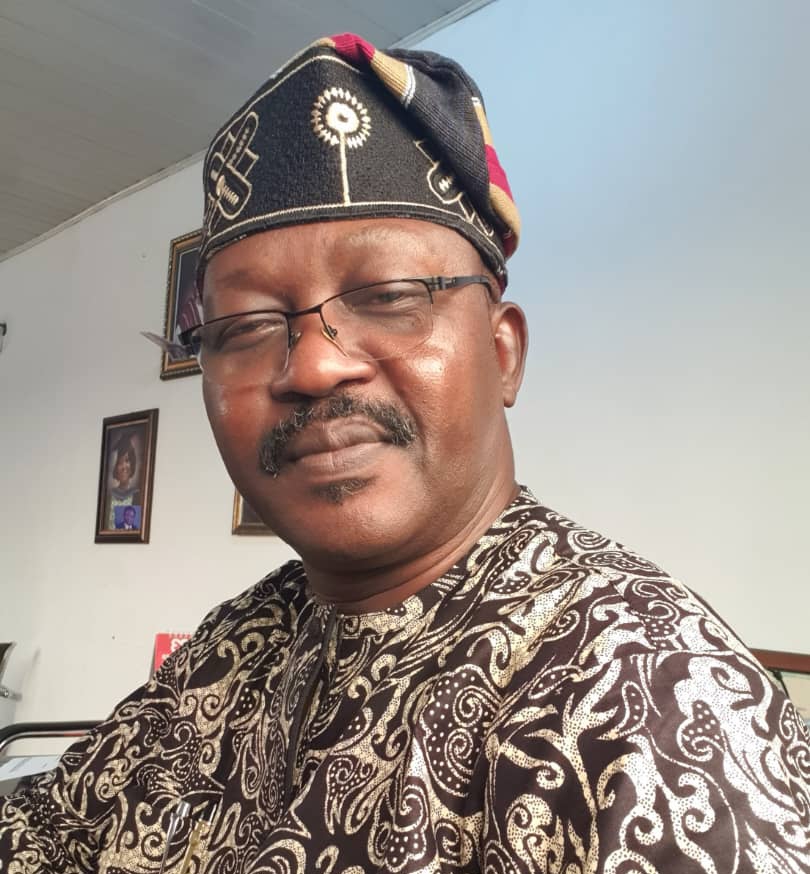 Chief Williams Fadoju.
Chief Williams Fadoju.
He emphasised that Nigeria’s reliance on physical manpower for protection of the railway was inefficient and insufficient, advocated that Railway Police should be a different arm of Police with its own Inspector General.
“We are in the 21st century. Today, there are two ways to production – technology and physical manpower. How many personnel are their in that unit called gangs in the Nigerian Railway Corporation? The total Nigerian Railway network shouldn’t be less than 6000Kms. Are you telling me that the gangers are up to 500 nationwide? They cannot be. Handing- over this job to physical manpower alone will resolve this crisis.
“The Nigerian Government and the Railway Corporation need to fund and deploy technology and commensurate manpower. Where you cannot make yourself present physically, you use technology. And, part of the technology is, using drones and electric wire fence to ensure that people cannot crossover or have access to the rail line.
“Promulgate a law that will make the railway police a different arm of police. The British Railway Police is under a commander equivalent of Inspector General of Police, unlike here where we have a unit that answers to the general DIG operations and same Inspector General of Police. Let there be a Nigerian Railway Police that will monitor the Nigerian Railway and their assignment will only be to monitor the railway network.”
▪ IMPERATIVES FOR A FUNCTIONAL RAILWAY IN NORTH-CENTRAL
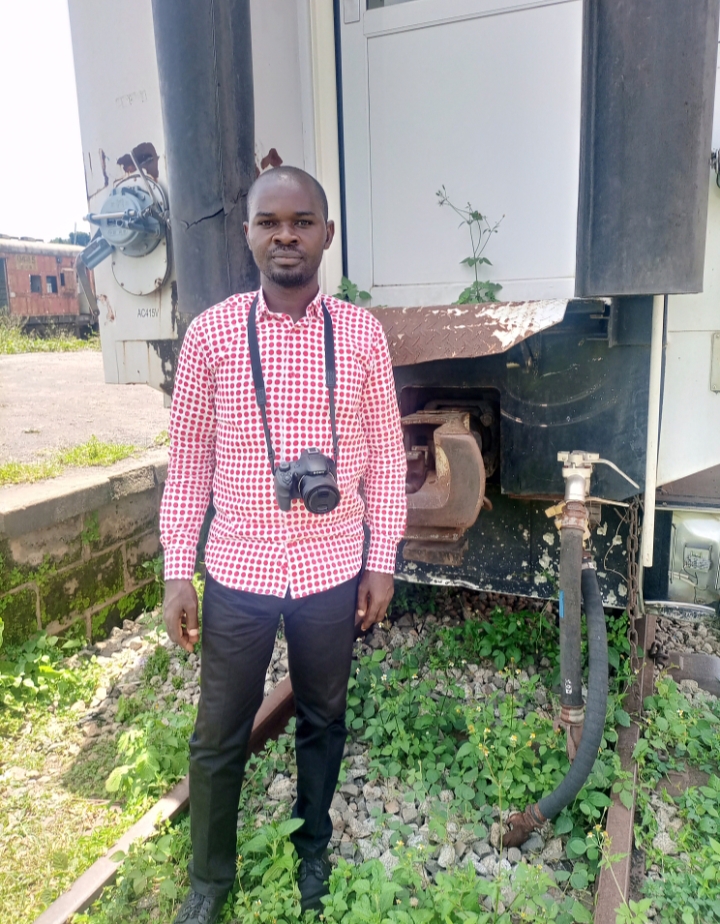 This reporter at the train terminal in Kafanchan, Kaduna State.
This reporter at the train terminal in Kafanchan, Kaduna State.
North-Central Nigeria is the food basket belt of the nation. Tonnes of cereal, legumes, vegetables, and tuber crops eaten in the South-South, South-East and South-Western regions are cultivated in the region. There are large-scale rice farms in Southern Kaduna. There is the Olam Rice in Nasarawa, among others. Thrice weekly, 18 wheelers (25 and 30 tons trucks) move food items down to the South-South and other parts of the country.
Low loaders carrying oversized and heavy cargoes move in and out of the region everyday despite the fact that the roads are not too good to sustain the weight of such trucks and trailers. A functional railway system would have eased movement of food from the region to different parts of the country, lessened transportation cost for merchandise and people, and reduced pressure of heavy trucks on roads.
Fadoju said in London, trains move about 7 to 10 million people to and fro work daily. Imagine if the railway system in North-Central Nigeria were functional and could move 1 million people daily into and out of the region. Imagine the revenue in sales of ticket and cargoes bills. A functional railway system could have mitigated the economic pains of fuel subsidy removal and attendant skyrocketing cost of transportation and goods.



